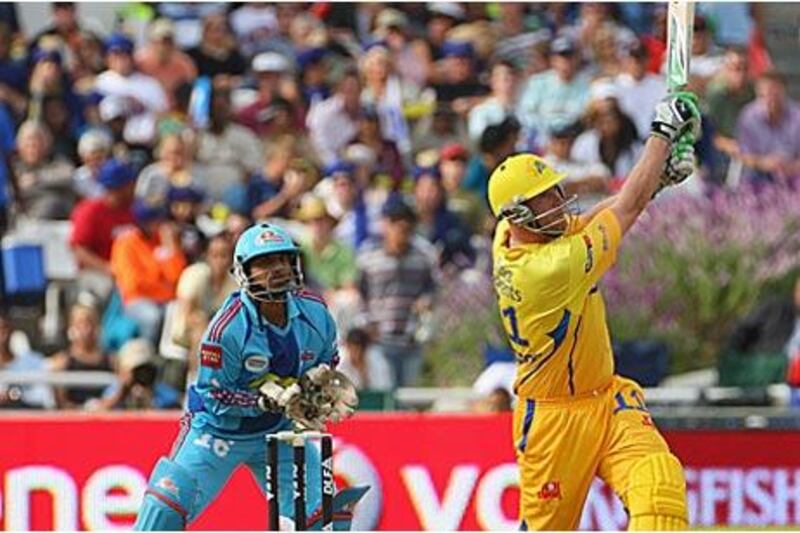Now that Australia have surrendered the Ashes to England for the second time in succession on their old enemy's home turf, the stories that are emerging off the pitch are just as intriguing as the events on it during the enthralling series. The media are prone to comment on the aspects of the game which go beyond bat and ball action.
We saw that when a story broke about the Australians telling the International Cricket Council (ICC) that one of their players had been approached by a bookmaker earlier in the tour. Keeping the ICC in the loop seemed the right thing to do. However, the Australian media (the Indian batting legend Sunil Gavaskar once called them the support staff of the Australian cricket team) can give bowling wizard Shane Warne a run for his money when it comes to spin.
They weaved in an angle about how the Indian Premier League (IPL) and Indian Cricket League left the game vulnerable when it came to betting and match-fixing. Reports also stressed how the Board of Control for Cricket in India (BCCI) decided to do away with ICC's Anti-Corruption Unit for the last IPL event held in South Africa. Sure, the BCCI were wrong for not embracing a system followed by the rulers of the game in a bid to stamp out the sport's biggest evil.
And the reason was ridiculous. The BCCI stayed quiet on an ICC offer for anti-corruption cover as they felt the cost of US$1.2million (Dh7.16m) was too expensive. When a fee was agreed it was too late for the unit to start work. This should all have been sorted out two months prior to the tournament to ensure anti-corruption measures were in place. But even with all that in mind, one cannot understand what the threat of corruption in the IPL has got to do with an Australian player being approached in England. But hey, why should that stop the pen-pushing spin-doctors?
In my opinion India and Pakistan have tried to arrest the evil. The fact some of their respective probes ended up being ridiculed by some pundits is not totally fair. Weren't players like Mohammed Azharuddin, Ajay Sharma, Ajay Jadeja and Manoj Prabhakar banned? Didn't Salim Malik face cricketing exile in Pakistan for what he had done? In contrast, what did the Australian Cricket Board (ACB) do when it was discovered that Mark Waugh and Shane Warne accepted money to disclose match-related information to a bookmaker in 1995?
They kept it out of the media and only confirmed that they had fined the duo when a journalist broke the story three years later. The writer, Malcolm Conn, won an award for this well-investigated story. But the cricket world only found out about the pair's involvement through Conn's story, which forced the ACB to call a hastily arranged media conference to finally reveal the truth. Alan Crompton, who was ACB chairman at the time, refused to admit that it was a cover-up job.
Meanwhile Matthew Hayden has called for the ICC Champions Trophy to be scrapped. It may be fair to point out that Hayden's outburst came after he had retired from international cricket and he said some audacious things during his playing days. Hayden made his point though and administrators, especially in Asia, are guilty of organising one-day series which only help in swelling the bank balances of boards and players.
An example is India versus Sri Lanka. India were in Sri Lanka last year for a Test and one-day series, returning later for a second one-day series. In a few days, they will be Sri Lanka-bound again. For whose benefit? Certainly, not the game's development. Talking of development, it must be underlined that the financial gains from the Champions Trophy was aimed at aiding under-developed cricketing countries when Jagmohan Dalmiya was president of the ICC.
It could have helped other "basic" matters too. J Y Lele, the straight-talking former secretary of the BCCI, once told me about a call he received from an ICC official in London, asking for India's affiliation fee to be dispatched before it was due. Lele was a sucker for procedure. When he was told the affiliation fee would help pay the salaries of ICC employees, he was soon on the phone to Dalmiya, asking whether he should release the money.
Dalmiya gave him the go-ahead with a promise that he would not allow the ICC to be short of funds again. He organised the first Champions Trophy in Dhaka and 11 years later it is still treated as the second most important 50-over tournament after the World Cup. Dalmiya had to deal with more than his share of vilification in his time as cricket's boss, but he put the ICC on a firm financial wicket. Let the man have his say: "When I became ICC president, we had £16,000 (Dh95,660). When I left, it had increased to £17 million". Hayden take note!
Clayton Murzello is Group Sports Editor of Indian newspaper Midday cmurzello@thenational.ae





